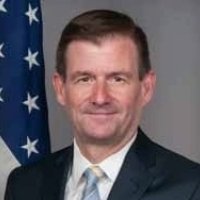Hindsight Up Front: Implications of Afghanistan Withdrawal for South Asia
The withdrawal of U.S. and coalition forces from Afghanistan, the rapid deterioration of the Afghan government and military, and the return of the Taliban will have profound implications for the future of South Asia.
Please join the Wilson Center in the latest event in our “Afghanistan: Hindsight Up Front” initiative as we discuss the future of the region with leading journalists, former diplomats, and thought leaders from India and Pakistan.
Key Takeaways
- Prospects for leverage to be used successfully by the region—and the United States—to influence Taliban behavior are relatively limited.
- South Asian states will continue to view Afghanistan through the lens of traditional security, with important challenges like water scarcity and climate change not receiving the attention they deserve.
- Despite differences, many countries in the region share a broad desire for more stability and less terrorism in Afghanistan.
Selected Quotes
David Hale
"I’d like to comment first on Afghanistan. Our leverage remains real…it’s limited. The Taliban, in my opinion, do not crave international legitimacy so much that they will compromise on their core principles or change their true colors. Their statements, the ones that we're hearing now, are to be expected, while their behavior, which we're seeing now, demonstrates that they've not really changed since 2001. And when they say governance will be guided by Sharia, they mean their version of the Sharia, which will make Saudi Arabia look a lot like the city of San Francisco."
"We must apply pressure, even if chances of it altering behavior are limited. We can build a coalition that will take the measures we have already taken, and more. I am speaking of freezing assets, stopping cash transfers, withholding diplomatic recognition, continuing UN sanctions, while of course communicating to the Taliban, how to ease these pressures, which would be on their part, suppressing ISIS and Al Qaeda, protecting human rights and humanitarian access, and allowing the processing of refugees, among other goals."
Maleeha Lohdi
"While there is no daylight between various members of the international community on what the expectation is of the Taliban. If you look at the Security Council statement, if you look at the OIC communique, you look at the Human Rights Council statement of two days ago. They all say the same thing, so do not underestimate the power of collective opinion, this is extremely important. I also think it's unprecedented. Never have I seen—I've served at the UN for five years—Never have I seen so much solidarity, in terms of expectations. So, I don't think it would be correct to say that the Russians and the Chinese want something else, and the Americans everybody wants, top of the agenda, as David Hale says, top of the agenda for everyone, is combating terrorism, there is no question about that."
Nandan Unnikrishnan
"A stable Afghanistan, under Taliban rule—oppressive or not, I'm not getting into that—would distinctly increase China's role in the region. China's BRI would definitely then move ahead and Central Asia, West Asia, and of course, parts of South Asia, would come under increasing influence of the Chinese. From an Indian perspective, given our current relationship with China, it is not necessarily the best scenario. But, at the same time, as I said, it is probably better than the second scenario, where Afghanistan is unstable. I think Ambassador Lodhi has very eloquently described what happens to the region, not only us, but even, let's say, Central Asia and other areas….It is a danger, not just to Pakistan, it's a danger for everyone."
Huma Yusuf
"No, I think this does get at the point that I was trying to make right at the outset, which is that, I think a lot of this, this myth of Pakistan’s leverage, or so-called, control, or puppet mastery of the Taliban, this is outdated and inaccurate and is certainly not rooted in what's to come. A lot of that will have to do with the dispensation that does emerge in Afghanistan and the level of control that a Taliban-led regime based in Kabul would have over the rest of the country, and on the sort of numerous militant groups that are operating in that area, and the fact that, we know that there will never be that kind of neat, centralized control, and we also know that, as activities happen and fingers are pointed here and there, that all groups will constantly try and refer to this idea of plausible deniability, that actually what I see emerging is a scenario where there is more potential for two sovereign states, Pakistan and Afghanistan, to find themselves at odds, and so there's this notion that Pakistan will be the leverage, Pakistan will speak to the Taliban, on behalf of the rest of the world, I just think that that's an outdated notion."
Venkateswaran Lokanathan
"The other question that I think requires a fair deal of deliberation is whether the US will accept a more proactive role for Russia and China in Afghanistan and the region moving forward. Russia has already started playing a more active role in neighboring Central Asia. President Putin has expressed concerns over the spillover of radical Islam into the region. Simultaneously, the presence of certain groups like the ETIM, which is sympathetic to the UYGHER cause in Xinjiang, also raises concern for China, and hence China is also now becoming more actively involved. It has already begun diplomatic engagement with Taliban, and President Xi, and President Putin, have also agreed to cooperate with developments in Afghanistan, and more importantly against foreign interference. "
Mark Green
"In 2020, Congress created a blue-ribbon panel of experts called the Afghanistan Study Group. Its purpose was to create new recommendations on Afghanistan for policymakers. I was a member of that study group. Our final report called “A Pathway for Peace,” concluded that the best American approach for Afghanistan, required a new overarching regional strategy. The report stated that Afghanistan lies in the middle of a region beset with rivalries and low levels of trust. It saw the potential for a fragile, but real regional consensus, behind a stable and neutral Afghanistan, that is neither a haven for terrorists, nor a fiefdom of the Taliban. We found that a stable Afghanistan would create the potential for regional economic cooperation that could benefit all countries in the region. But we also warned that an unstable Afghanistan risks destabilizing the region, to continue trade and illicit drugs, the attraction of extremist ideologies, and the possible exacerbation of the rivalry between India and Pakistan, two nuclear-armed powers."
Speakers

Former Under Secretary of State for Political Affairs; Former Ambassador to Pakistan, Lebanon, and Jordan

Former Ambassador of the Islamic Republic of Pakistan to the United States and United Nations

Former Assistant Director, National Security Council Secretariat, Government of India


Columnist, Dawn Newspaper, Pakistan
Introduction

Moderator

Hosted By

Indo-Pacific Program
The Indo-Pacific Program promotes policy debate and intellectual discussions on US interests in the Asia-Pacific as well as political, economic, security, and social issues relating to the world’s most populous and economically dynamic region. Read more
